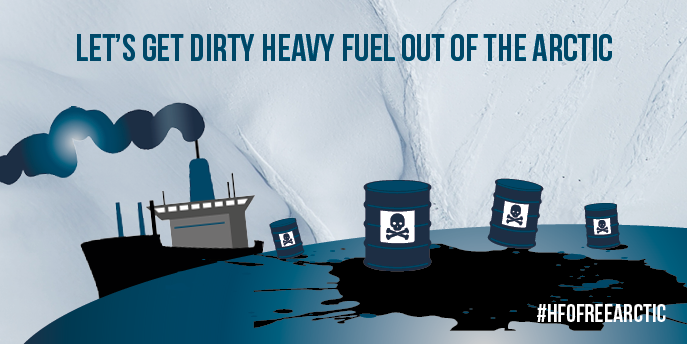Clean Arctic Alliance Response to EU Parliament Ocean Governance Vote
Brussels, January 16th, 2018;- In response to the passing of the resolution by the EU Parliament, on international ocean governance in the context of the 2030 Sustainable Development Goals, Dr Sian Prior, lead advisor to the Clean Arctic Alliance, said:
“The Clean Arctic Alliance welcomes the adoption of the European Parliament Resolution on international ocean governance, and in particular its commitment towards ending the use of heavy fuel oil and its carriage in fuel tanks in Arctic shipping. The EU parliament’s position is further evidence that heavy fuel oil use in the Arctic is no longer acceptable – its presence in the Antarctic has been prohibited for some years, and last year the International Maritime Organization began moves towards its phase out. It is now imperative that the risks associated with burning HFO and carrying HFO fuel are eliminated in the Arctic.”
“The decision by the IMO last summer to start a new work process to address HFO risks to the Arctic was a good step in the right direction. But the success of this process will be judged by its speedy outcome. The collision and ensuing environmental disaster in the East China Sea in the past two weeks is yet another reminder that ships are not immune against accidents. Taking stock of this unfortunate event, the IMO must expedite the work on addressing HFO risks in the Arctic with the view of banning it for on-board use and carriage in fuel tanks”: said Faig Abbasov, shipping officer at Transport & Environment, member of Clean Arctic Alliance.
Notes:
Figures from 2015 show that under half (44%) of vessels operating in the Arctic were using heavy fuel oil (HFO), however, because it tends to be the larger vessels operating on HFO, around 75% of the marine fuel currently carried as bunkers in the Arctic is HFO.
Switch to Cleaner Fuels Could Lower Risk for Arctic Shipping: Report
July 2017: “The proposal, Measures to Reduce Risks of Use and Carriage of Heavy Fuel Oil as Fuel by Ships in Arctic Waters was proposed by Canada, Finland, Germany, Iceland, the Netherlands, Norway and the US, and supported… by the Czech Republic, Denmark, Estonia, France, Poland, Singapore, Spain and Sweden. Concrete proposals for measures to reduce the risks of HFO will now be considered by MEPC 72 in April 2018. (2)” Clean Arctic Alliance Welcomes IMO Action on Arctic Heavy Fuel Oil Risk
HFO references in the resolution text
W. whereas the risks posed by the use of heavy fuel oil (HFO) in Arctic maritime transport are multiple: in the event of spills, the highly dense fuel emulsifies, sinks and can travel extremely long distances if it gets trapped in ice; spilled HFO poses enormous risks to the food security of Arctic indigenous communities, whose subsistence depends on fishing and hunting; combustion of HFO produces sulphur oxides and heavy metals, as well as large amounts of black carbon, which, when deposited on Arctic ice, stimulates the absorption of heat into the ice mass, accelerating the melting process and the effects of climate change; whereas the transport and use of HFO is prohibited by the IMO in the waters surrounding the Antarctic;
31. Reiterates the call made in its resolution of 16 March 2017 on an integrated European Union policy for the Arctic(21)1 for the Commission and the Member States to take all necessary measures to play an active role in facilitating an internationally agreed ban on the on-board use and carriage in fuel tanks of HFO in vessels navigating the Arctic seas, by means of the provisions of the International Convention for the Prevention of Pollution from Ships (MARPOL) currently applying for regulating the waters surrounding the Antarctic; invites the Commission to include the environmental, social, health and climate risks of the use of HFO in its position on International Ocean Governance; calls on the Commission, in the absence of adequate international measures, to put forward proposals on rules for vessels calling at EU ports prior to journeys through Arctic waters, with a view to prohibiting the use and carriage of HFO;
Contacts:
For more information, please contact Dave Walsh, Communications Advisor, HFO-Free Arctic Campaign, [email protected], +34 692 826 764

